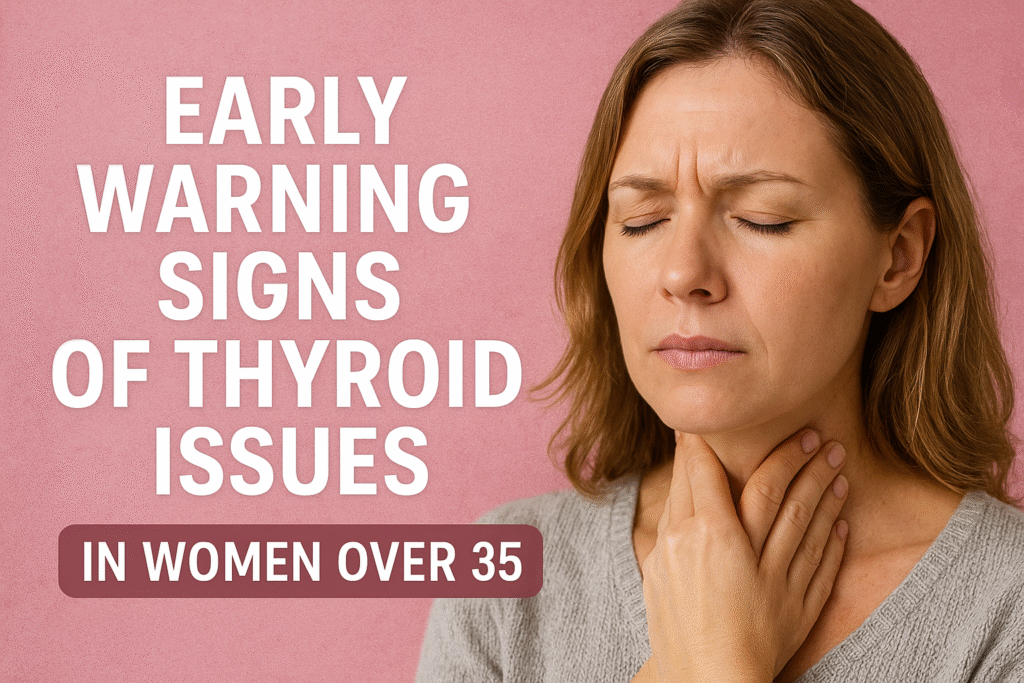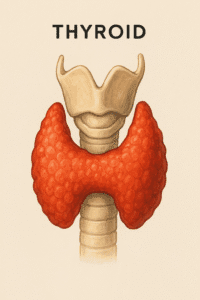
⚠️ Affiliate Disclaimer: This post may contain affiliate links, which means I may earn a small commission — at no extra cost to you — if you make a purchase through one of these links. I only recommend products or services I genuinely trust and believe can provide value. Thank you for supporting My Medical Muse!
12 Early Warning Signs of Thyroid Issues in Women Over 35 You Need to Know
Early Warning Signs of Thyroid Issues in Women Over 35
Thyroid problems are common especially in women and their early signs can be subtle. Knowing what to watch for after 35 can make all the difference in getting timely care.
Table of contents:
- Introduction: Why the thyroid matters after 35
- Quick primer: What the thyroid does (and why it’s important)
- Common thyroid conditions in women over 35
- Early warning signs to watch for
- Symptoms of hypothyroidism (underactive thyroid)
- Symptoms of hyperthyroidism (overactive thyroid)
- Symptoms that might overlap or be subtle
- Risk factors that raise suspicion
- How thyroid problems are diagnosed
- When to see your healthcare provider — red flags and checkpoints
- Treatment options: from lifestyle to medicine and procedures
- Practical lifestyle changes that support thyroid health
- Diet and supplements: what helps and what to avoid
- Managing coexistence: thyroid issues with menopause, mental health, and other conditions
- What to expect after diagnosis: monitoring and long-term care
- Common myths and misconceptions
- Quick checklist you can use (download-friendly)
- FAQ
- Final thoughts: tune into your body and advocate for your health
Introduction: Why the thyroid matters after 35
If you’re a woman over 35 and you’ve been feeling “off” lately, more tired than usual, struggling with weight changes, or noticing mood shifts, your thyroid might be involved. The thyroid is a small gland near the front of your neck with a huge impact. It helps regulate metabolism, temperature, energy levels, and even mood and cognitive function.
Thyroid disorders become more common with age, and women are disproportionately affected. Subtle symptoms can be easily mistaken for stress, aging, or perimenopause. That’s why a solid understanding of the early warning signs is essential: catching thyroid issues early often leads to simpler, more effective treatment and a quicker return to normal life.
This post walks you through what to look for, how thyroid problems are diagnosed, simple lifestyle steps you can take today, and when to seek medical help.
Quick primer: What the thyroid does (and why it’s important)
The thyroid is a butterfly-shaped gland that sits at the base of your neck. It makes thyroid hormones, primarily thyroxine (T4) and triiodothyronine (T3), which travel through your bloodstream and influence nearly every organ system. These hormones play a key role in:
- Regulating metabolism (how efficiently your body burns fuel)
- Controlling heart rate and body temperature
- Supporting brain function and mood
- Affecting menstrual cycles and fertility
- Maintaining energy levels and muscle strength
When the thyroid makes too little hormone (hypothyroidism) or too much (hyperthyroidism), the body’s systems can slow down or speed up and symptoms can appear gradually or suddenly.
Common thyroid conditions in women over 35
Some thyroid problems are more common than others:
- Hashimoto’s thyroiditis: an autoimmune condition that is the leading cause of hypothyroidism in many countries. The immune system attacks the thyroid, causing it to stop producing enough hormones over time.
- Graves’ disease: an autoimmune condition that commonly causes hyperthyroidism.
- Nodules and goiter: lumps or enlargement of the thyroid. Many nodules are benign, but they can affect hormone levels or require investigation.
- Subclinical thyroid disease: abnormal blood tests (TSH and/or free T4) with mild or no symptoms. This is common in people over 35 and sometimes warrants treatment depending on the situation.
Women are at higher risk for autoimmune thyroid disease, and risk rises after pregnancy, during perimenopause, and later in life.
Early warning signs to watch for
Because symptoms can be subtle, it helps to divide them by the type of dysfunction.
Symptoms of hypothyroidism (underactive thyroid)
Hypothyroidism slows the body down. Common early signs include:
- Persistent fatigue: more than expected from lifestyle or stress, a deep tiredness that rest doesn’t fix.
- Unexplained weight gain or difficulty losing weight despite diet and exercise.
- Sensitivity to cold: feeling cold when others don’t, or chillier than usual.
- Dry skin and brittle nails: skin may become coarse; nails may break or split.
- Constipation: new or worsening constipation without other cause.
- Hair thinning or hair loss: particularly on the scalp or outer edges of the eyebrows.
- Bradycardia (slow heart rate): feeling like your heart is beating slower than usual.
- Memory problems or slower thinking: feeling foggy or forgetful.
- Depressive symptoms: low mood, low motivation, loss of interest in activities.
- Irregular or heavier menstrual periods: changes in flow or cycle length.
Because these symptoms overlap with aging, stress, and perimenopause, hypothyroidism can be missed.
Symptoms of hyperthyroidism (overactive thyroid)
Hyperthyroidism speeds systems up. Watch for:
- Unexplained weight loss despite normal or increased appetite.
- Rapid or irregular heartbeat (palpitations), anxiety: feeling jittery or nervous.
- Heat intolerance and excessive sweating: feeling hot even when others are comfortable.
- Tremors: small shaking, usually in the hands.
- Trouble sleeping (insomnia): lying awake or not refreshing sleep.
- Increased bowel movements or diarrhea.
- Muscle weakness: especially in the thighs and upper arms.
- Light or missing periods: menstrual irregularities or reduced flow.
- Eye symptoms: in Graves’ disease, bulging eyes, eye irritation, or vision changes can occur.
Symptoms that might overlap or be subtle
Some signs are less specific but still important to note:
- Neck changes: swelling at the base of the neck, a visible lump, or a sensation of fullness.
- General changes in energy and mood: mood swings, irritability, or a lack of motivation.
- Changes in cholesterol: hypothyroidism can raise LDL cholesterol even with a stable diet.
- Musculoskeletal pain: aches, stiffness, or slower recovery after exercise.
If you notice clusters of these symptoms even if each one feels minor, it’s worth checking thyroid function.
Risk factors that raise suspicion
Certain factors make thyroid disease more likely. If you have one or more of these, screening should be considered:
- Family history of thyroid disease or autoimmune conditions.
- Personal history of other autoimmune diseases (type 1 diabetes, celiac disease, rheumatoid arthritis, lupus).
- Previous thyroid surgery or radiation to the neck.
- Pregnancy or recent postpartum period: women can develop postpartum thyroiditis in the year after giving birth.
- Perimenopause or menopause: overlapping symptoms can mask thyroid disease.
- Age: prevalence increases with age, particularly after 35-40 years.
- Being female: women are several times more likely than men to develop thyroid problems.
If you have any of these and new unexplained symptoms, mention them to your clinician.
How thyroid problems are diagnosed
Diagnosis is straightforward in most cases and starts with blood tests.
Key blood tests
- TSH (thyroid-stimulating hormone): the most sensitive screening test. A high TSH suggests hypothyroidism; a low TSH suggests hyperthyroidism.
- Free T4 (free thyroxine): measures available thyroid hormone. Helps stage the severity and confirm diagnosis.
- Free T3: sometimes useful, especially in hyperthyroidism or when symptoms don’t match TSH/T4.
- Thyroid antibodies: anti-thyroid peroxidase (anti-TPO) and anti-thyroglobulin (anti-Tg) antibodies point to autoimmune thyroid disease (Hashimoto’s). Thyroid-stimulating immunoglobulin (TSI) suggests Graves’ disease.
Imaging and other tests
- Ultrasound: used to evaluate nodules, goiter, or structural concerns.
- Radioactive iodine uptake scan: used in some cases of hyperthyroidism to determine cause.
- Fine-needle aspiration (FNA): used when a nodule looks suspicious on ultrasound.
A clinician will interpret results in the context of symptoms, medical history, and risk factors.
When to see your healthcare provider (red flags and checkpoints)
Make an appointment if you have persistent or worsening symptoms from the lists above, especially if they interfere with daily life.
Urgent care / emergency:
- Sudden, severe palpitations, chest pain, fainting, or shortness of breath.
- Signs of thyroid storm (rare but life-threatening): high fever, severe tachycardia, confusion, or vomiting.
See your primary care clinician or endocrinologist if:
- You have persistent fatigue, weight changes, mood changes, or menstrual irregularities.
- You notice visible swelling or a lump in your neck.
- You have a family history of thyroid disease or an autoimmune condition plus symptoms.
Routine screening blood tests are sometimes recommended during pregnancy, postpartum, or when planning pregnancy, and when other risk factors exist. Ask your provider about screening if you’re unsure.
Treatment options: from lifestyle to medicine and procedures
Treatment depends on the cause and severity.
For hypothyroidism
- Levothyroxine (synthetic T4) is the standard treatment. It’s taken once daily and doses are adjusted based on TSH and symptoms. Most people feel better within a few weeks, but it can take a few months to feel fully back to normal.
- Combination therapy (T4 + T3) may be considered in select cases where symptoms persist despite normal blood tests, though evidence is mixed and careful specialist oversight is necessary.
- Monitoring is ongoing, TSH is rechecked 6-8 weeks after starting or changing dose and then periodically.
For hyperthyroidism
- Antithyroid medications (methimazole or propylthiouracil) reduce hormone production.
- Radioactive iodine therapy may be used to destroy overactive thyroid tissue and is commonly used in older adults.
- Surgery (thyroidectomy) is an option for large goiters, suspicious nodules, or when other treatments are not suitable.
- Beta-blockers help control symptoms like palpitations and tremor while other treatments take effect.
For nodules and structural issues
- Observation with periodic ultrasound if nodules are small and benign-appearing.
- Biopsy (FNA) when nodules meet size or appearance criteria.
- Surgery for nodules that are large, growing, or suspicious.
The right treatment is individualized based on age, pregnancy plans, severity, and personal preferences.
Practical lifestyle changes that support thyroid health
While medication is essential when the thyroid is dysfunctional, lifestyle has a supportive role:
- Manage stress: chronic stress disrupts the immune system and can worsen autoimmune flare-ups. Practices like deep breathing, yoga, meditation, and regular sleep help.
- Prioritize sleep: aim for consistent, restorative sleep. Poor sleep worsens fatigue and mood.
- Regular, moderate exercise: helps control weight, supports mood, and improves metabolic health.
- Avoid extreme diets: very low-calorie or fad diets can stress the body and sometimes worsen thyroid function.
- Maintain a healthy weight: weight changes are common with thyroid issues; gradual, sustainable changes are safer.
- Limit smoking and excessive alcohol: both can interfere with thyroid and overall hormonal health.
These steps won’t replace medication for most people, but they help treatment work better and reduce symptom burden.
Diet and supplements: what helps and what to avoid
Nutrition plays a supportive role. A few evidence-based tips:
Helpful nutrients
- Iodine: essential for thyroid hormone production. Most people get enough iodine from iodized salt and a varied diet. Don’t take high-dose iodine supplements unless advised by a doctor.
- Selenium: may support thyroid antibody reduction in autoimmune thyroiditis. Found in Brazil nuts, seafood, eggs, and legumes. Discuss supplements with your provider.
- Vitamin D: deficiency is common and linked to autoimmune conditions. Check levels with your clinician and supplement if needed.
- Iron: low iron can interfere with thyroid hormone synthesis and medication absorption. Treat iron deficiency if present.
Foods/supplements to be cautious about
- Goitrogens: compounds in cruciferous vegetables (broccoli, cabbage, kale) can interfere with thyroid function in very large amounts if iodine is low. For most people eating a balanced diet, these vegetables are fine and healthy.
- Soy: large amounts can affect thyroid medication absorption. Space soy foods or supplements a few hours apart from levothyroxine.
- Iron, calcium, antacids, and some supplements: these can block absorption of levothyroxine; take the thyroid medicine on an empty stomach and wait at least 30-60 minutes before eating or taking supplements.
Always discuss supplements with your clinician they can interact with medications or be unnecessary.
Managing coexistence: thyroid issues with menopause, mental health, and other conditions
After 35, many women enter perimenopause and later menopause, which can cause hot flashes, mood swings, sleep changes, and weight shifts, symptoms that overlap with thyroid disease. That makes clear communication with your clinician essential.
- Menopause and thyroid overlap: your provider may evaluate both hormone panels and thyroid tests when symptoms overlap.
- Mental health: depression and anxiety can be caused or worsened by thyroid dysfunction. Treating the thyroid often improves mood, but some people still need psychological or psychiatric care.
- Cardiovascular risk: untreated thyroid disease (especially hyperthyroidism) can affect heart rhythm and bone health. Hypothyroidism can affect cholesterol and cardiovascular risk.
Coordinate care: your PCP, gynecologist, and an endocrinologist can work together to optimize treatment.
What to expect after diagnosis: monitoring and long-term care
Thyroid disorders are usually chronic but manageable.
- Medication adjustments: it’s common to tweak doses during the first months. Keep a steady routine and track symptoms.
- Regular tests: TSH and possibly free T4 checks are part of routine follow-up. Frequency depends on stability (every 6-12 months if stable, more often if changing dose or pregnancy is planned).
- Pregnancy planning: thyroid requirements change during pregnancy. If you’re planning pregnancy or become pregnant, notify your provider immediately.
- Bone and heart health: long-term thyroid dysfunction can affect bones and heart; appropriate screening and preventive measures may be recommended.
Many people lead normal, healthy lives with proper treatment and monitoring.
Common myths and misconceptions
- Myth: Thyroid disease is rare. Actually, it’s common, especially in women. Many cases go undiagnosed because symptoms are subtle.
- Myth: You’ll notice severe symptoms immediately. Symptoms often develop slowly and can be mistaken for stress or aging.
- Myth: Natural or herbal remedies can replace medication. Supplements may help in some cases, but they do not reliably replace levothyroxine or antithyroid drugs when those are needed.
- Myth: If your TSH is “normal,” your thyroid is fine. Some people have normal TSH but symptoms and abnormal antibodies or free T3/T4, discuss persisting symptoms with your provider.
Always verify information with your clinician and trusted medical sources.
Quick checklist you can use
If you notice any of the following, consider testing your thyroid or seeing a healthcare provider:
- New, persistent fatigue
- Unexplained weight gain or loss
- Sensitivity to heat or cold
- New or changed menstrual cycles
- Hair thinning or brittle nails
- Palpitations, tremors, or anxiety
- New lump or swelling in the neck
- Constipation or increased bowel movements
- Memory problems or brain fog
- Mood changes or depressive symptoms
FAQ
Should all women over 35 be screened for thyroid disease?
- Guidelines vary. Routine screening isn’t universally mandated for all women over 35, but many clinicians recommend testing if you have symptoms, a family history, other autoimmune diseases, or are pregnant/planning pregnancy. Discuss screening with your clinician based on your risk profile.
How long does it take to feel better after starting thyroid medicine?
- Many people notice improvements within 2-6 weeks for hypothyroidism after starting levothyroxine, but full recovery and dose optimization can take a few months. For hyperthyroidism, symptom improvement depends on the treatment used; medications, radioactive iodine, or surgery timelines differ.
Can thyroid disease affect fertility?
- Yes. Untreated thyroid disease (both hypo- and hyperthyroidism) can interfere with ovulation and menstrual cycles. Treating thyroid dysfunction often improves fertility.
Is thyroid disease hereditary?
- There’s a genetic component, having a family member with thyroid disease increases your risk. Autoimmune thyroiditis also clusters with other autoimmune conditions.
Will I need lifelong medication?
- Many people with hypothyroidism, especially from Hashimoto’s, need lifelong levothyroxine. Hyperthyroidism may be cured or permanently treated with radioactive iodine or surgery, after which levothyroxine may be required.
Final thoughts: tune into your body and advocate for your health
If you’re a woman over 35, the body changes you’re experiencing may simply be part of life but they might also be a sign of treatable thyroid dysfunction. The difference between “living with symptoms” and “regaining energy and balance” often comes down to checking your thyroid when symptoms arise.
Keep a symptom diary, note changes in menstrual cycles, sleep, and energy, and don’t hesitate to bring concerns to your clinician. When in doubt, get a TSH test, it’s quick, inexpensive, and often the first step to answers.
You don’t have to accept chronic fatigue, unexplained weight changes, or mood shifts as just growing older, with the right tests and the right care, many thyroid conditions are easily managed and life can feel a lot better.
👩⚕️ Need Personalized Health Advice?
Get expert guidance tailored to your unique health concerns through MuseCare Consult. Our licensed doctors are here to help you understand your symptoms, medications, and lab results—confidentially and affordably.
👉 Book a MuseCare Consult NowRelated Post You Might Like:
- Why Am I Always Cold Even in Warm Weather?
- 12 Essential Early Signs Your Metabolism Is Slowing Down
- 13 Early Signs of Health Problems You Shouldn’t Ignore for Better Health
- 7 Lesser-Known Lifestyle Triggers of Hormonal Imbalance in Women and How to Fix Them
- 13 Sneaky Signs of Magnesium Deficiency in Women (And How to Fix It Naturally)
- Why Does My Skin Feel Sunburned Even When It’s Not? 7 Hidden Causes & Solutions
Dr. Ijasusi Bamidele, MBBS (Binzhou Medical University, China), is a medical doctor with 5 years of clinical experience and founder of MyMedicalMuse.com, a subsidiary of Delimann Limited. As a health content writer for audiences in the USA, Canada, and Europe, Dr. Ijasusi helps readers understand complex health conditions, recognize why they have certain symptoms, and apply practical lifestyle modifications to improve well-being



